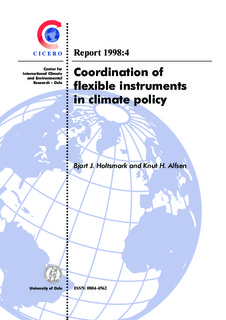Coordination of flexible instruments in climate policy
Research report
Permanent lenke
http://hdl.handle.net/11250/192076Utgivelsesdato
1998Metadata
Vis full innførselSamlinger
- CICERO Reports [210]
Sammendrag
The Kyoto Protocol must be the starting point for the choice of domestic climate policy instruments. It is so far uncertain whether the required number of Parties will ratify the Protocol for the Protocol to enter into force. At least emissions trading, but possibly also Joint Implementation and the Clean Development Mechanism are, however, flexible mechanisms that must be established before ratification by for example the USA can take place. Making national preparations for domestic abatement efforts in order to be in compliance with the Kyoto Protocol should therefore assume that the mentioned flexible mechanisms are important elements of the international framework. The chosen domestic policy instruments should in other words fit to an international market for quotas.
It has to be taken into consideration that if the Protocol enters into force all private entities will have the right to acquire emission permits through CDM and JI-projects. It would be a sort of undermining of the Protocol if the national authorities at the same time do not accept these permits as legal emission rights. Thus, the corresponding emissions should not be subject to for example emission taxes. In other words, the national policies can’t be seen in isolation from the flexible mechanisms. Through these mechanisms the private entities are linked to the international quota market and national policies must take that into consideration.
Regarding the relationship between the flexible mechanisms and the different domestic policy instruments, we have concluded as follows:
The international market for quotas will be competitive only if governments do not dominate it. That is the main reason why private entities should be allocated quotas from their respective governments and be allowed to trade at the international market. Such a regime would induce both a cost-effective division of domestic abatement efforts and a cost-effective allocation of abatement internationally.
Limiting the permit market to only some few industries combined with emission taxes in other parts of the economy will reduce the cost-effectiveness if we rule out the possibility that the emission tax varies in step with the permit price. Furthermore, if private firms are allowed to trade quotas internationally, this will short circuit the barrier between firms inside and outside a domestic permit market. Large traders in the domestic market will also reduce the cost-effectiveness because a smaller market for permits may lead to strategic behaviour.
"Grandfathering" of national permits will not reduce the number of shutdowns unless there are restrictions on the possibilities for selling the "grandfathered" quotas. Such limitations on market transactions will reduce the cost-effectiveness of the instrument. Future rules for the international quota market might furthermore ban such restrictions on the tradable permits and might already be in conflict with the rules for free trade in the European Economic Area (EEA).
A GHG tax is a cost-effective instrument if the tax rates do not vary across sources and sectors. In principle the domestic emitters could be allowed to acquire quotas through the flexible mechanisms internationally and have the emission tax repaid in accordance with the acquired number of quotas. Allocating tradable permits is however probably a more convenient method for linking domestic abatement to the flexible mechanisms internationally.
CDM is a supplement or enlargement to the ordinary quota market. The relationship between Joint Implementation and emissions trading is somewhat unclear. The development of the rules for JI and quota trading will probably elaborate that relationship.
